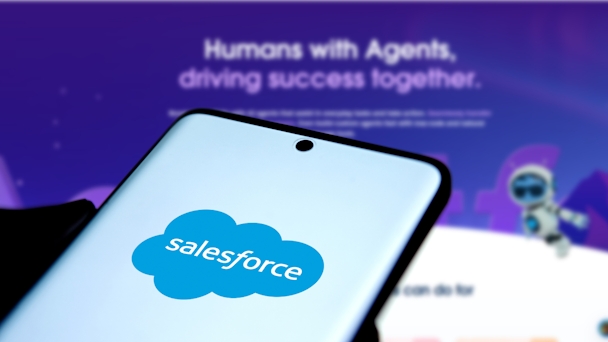Inside Salesforce’s bold ambitions to deploy 1bn enterprise AI agents within a year
The software company believes its recently launched Agentforce will not only find diverse applications in marketing, sales and commerce – but will also help it win business from Microsoft.

Salesforce wants to take on Microsoft in the arena of enterprise AI / Adobe Stock
At its annual Dreamforce conference in September, Salesforce unveiled Agentforce, which promises a new era of autonomous AI-powered agents for businesses. The program could create new possibilities not only for customer service and operations management but also for marketing and advertising.
The successor to Salesforce’s Einstein AI platform, Agentforce is positioned as a next-generation platform designed to enhance sales, service, marketing and commerce efforts through autonomous agents powered by the company’s Data Cloud. Unlike traditional chatbots, Agentforce proactively manages tasks, triggered by real-time data and specific business rules that have been established by the user, to improve efficiency and customer satisfaction.
The company suggests Agentforce is faster and simpler to deploy than building custom programs. “Salesforce is taking care of the 80% of the work and allowing [the customer] to focus on the 20% that really differentiates you as a business – versus the other way around in traditional models, where you’re having to do it yourself and DIY the AI and having to spend all the money and resources on the foundational elements,” Adam Forrest, SVP of marketing at Salesforce, tells The Drum.
He explains that businesses can input their specific business rules and data sources and build out custom agents that seamlessly act in accordance with those inputs. “This really puts the power back into the hands of business admins, developers and technology teams,” he says.
A number of major companies have already begun to embrace Agentforce for key business functions. OpenTable, for instance, is using Agentforce to triage incoming reservation requests and make better operational decisions based on that data. Meanwhile, retailer Saks Fifth Avenue is harnessing the program to automate decisions concerning product returns and exchanges. Other early adopters include Disney and education publisher Wiley.
Want to go deeper? Ask The Drum
The rollout signifies a bold foray for the software company into the increasingly crowded AI market.
Just a few weeks after the debut, Salesforce CEO Marc Benioff suggested that the company could go head-to-head on AI with Microsoft – the developer of AI chatbot Copilot and the biggest backer of ChatGPT parent OpenAI. He went so far as to say on the Masters of Scale: Rapid Response podcast, “Microsoft has done a tremendous disservice to not only our whole industry but all of the AI research that has been done” by overpromising on products like Copilot. He argued that Salesforce’s AI tools, on the other hand, enable users to “see for themselves exactly what is possible, what is real and how easy it is to get huge value from AI.”
Microsoft, as well as Google and ServiceNow have all signaled plans to launch their own AI agents.
Marketing magic unlocked?
Salesforce contends that AI agents won’t just streamline customer service and operations, but will also help to automate critical marketing initiatives.
For one, agents can refine the lead qualification process and improve outreach efforts, industry leaders suggest. “In account-based marketing, AI agents analyze customer data to identify high-value opportunities and craft tailored outreach strategies for key decision-makers,” explains Jonathan Franchell, founder and CEO of B2B marketing agency Ironpaper. “They streamline lead qualification by evaluating intent signals and scoring leads based on engagement and fit, helping sales teams focus on the most promising prospects.”
Once leads have been vetted, Agentforce, in Forrest’s telling, can help marketers optimize the timing of their communications and enhance personalization. For retailers, for example, he notes that agents can suggest the best times to engage customers – like during holiday promotions – based on users’ website activity.
It’s an idea that’s applicable not only in consumer-facing applications, but also in B2B contexts. AI agents “can evaluate customer context, so it provides a more intuitive communication. That could lead to a B2B customer being offered better recommendations on essential items for them,” says Baruch Labunski, CEO at SEO agency Rank Secure.
Advertisement
Once a campaign has been deployed, agents may also help marketers better evaluate campaign performance and optimize their strategies accordingly. “AI agents transform campaign management by monitoring real-time performance and suggesting adjustments to improve ROI and resource allocation,” Ironpaper’s Franchell says. He notes that agents can also improve customer retention “by analyzing feedback and identifying patterns that inform upselling or cross-selling strategies.”
Plus, Agentforce’s ability to integrate with CRM platforms means that marketers can more easily share insights with sales teams and vice versa.
For some marketers, the dream is that, by way of automating a range of laborious processes, AI agents will ultimately free marketers to focus on high-level strategy and creativity.
“Agentic AI can eliminate friction and dissolve traditional silos in data, organizational structures, and customer touchpoints. The result? Smarter insights, more efficient media and distribution and more time for creatives to focus on what they do best: creating,” says Dan Gardner, co-founder of Code and Theory, a digital-focused creative agency.
Advertisement
The potential limitations and shortcomings
Despite the positive momentum, Salesforce is sure to face hurdles on the road ahead. Besides Microsoft, competitors including OpenAI and Anthropic are making significant strides in enterprise AI. Plus, HubSpot, a more direct CRM rival, has already rolled out its own AI assistant, Breeze.
At the same time, Salesforce must also prove Agentforce’s value across a diverse range of industries and applications in order to scale.
Suggested newsletters for you
Plus, some have pointed out that Salesforce’s approach of integrating AI agents deeply into its existing ecosystem could end up being a double-edged sword, offering a seamless experience for existing customers but requiring a steep buy-in for newcomers.
And in the world of marketing, there are nonbelievers, too. “True AI agents don’t exist yet, and they certainly aren’t what Salesforce is selling,” says Matt Howland, chief product and engineering officer at Cordial, a martech provider. “We’re currently looking at basic task automation – think of it as the freshman intern of agents. [Salesforce is] marketing what amounts to souped-up integration tools as revolutionary AI agents. It’s like putting lipstick on a pig – a very expensive, enterprise-grade pig.”
Early indicators of momentum
For now, Salesforce is all-in on Agentforce. And it’s gaining traction. In the third quarter, the company closed 200 Agentforce deals, including with major customers like FedEx, Accenture and IBM.
On a call with investors Tuesday, Benioff spelled out a vision for the future of Agentforce and Salesforce’s AI practice in which agents act as true collaborators – not just tools – working alongside humans to analyze data, make decisions and resolve issues at unprecedented speed. He envisions this paradigm evolving into a more sophisticated “robotic layer” that could have applications across industries.
“Agentforce represents this next evolution of Salesforce … This is just the beginning of a complete digital transformation for the world … all of this is going to change society [in a way that is] only visible today in the movies or in our imaginations, but we can see it unfolding right here through this company, Salesforce,” Benioff said.
Salesforce’s stock surged Wednesday in response to the company’s rosy Q3 numbers and the apparent optimism around Agentforce.
Benioff has said that he hopes to see one billion Agentforce agents deployed by the end of 2025. Whether demand can match his ambition remains unclear at this moment.
But some don’t think it’s a far-fetched goal. “Marc Benioff’s confidence is well-founded. Salesforce has consistently demonstrated its ability to innovate and adapt to enterprise needs. With the launch of Agentforce, Salesforce has taken a significant leap forward,” says Artur Akhmetov, director of Salesforce practice at T1A, a martech and analytics firm. “While Microsoft undoubtedly has a strong AI portfolio, including tools like Copilot, there have been some concerns in the market regarding adapting these tools for CRM processes. Salesforce, on the other hand … [can tap into] decades of CRM expertise to design AI that solves specific business pain points effectively.”
For more, sign up for The Drum’s daily newsletter here.
